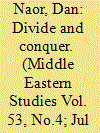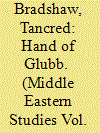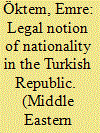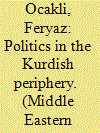|
|
|
Sort Order |
|
|
|
Items / Page
|
|
|
|
|
|
|
| Srl | Item |
| 1 |
ID:
152608


|
|
|
|
|
| Summary/Abstract |
This article examines the attitude of Syria toward Lebanon during the first years of Hafiz al-Assad's regime. Assad adhered to the policy of ‘divide and conquer’, in which Syria purposefully prevented any Lebanese figure from becoming too powerful in the political arena. The article will analyze two cases of prominent Lebanese leaders in which Syria applied this policy, President Suleiman Frangieh and the Druze leader Kamal Jumblatt. Both were close allays of Assad, but this fact did not prevent the latter from acting against his friends. The article's main claim is that by using this policy, Assad paved the way for Syrian intervention and increasing influence in the land of the cedars.
|
|
|
|
|
|
|
|
|
|
|
|
|
|
|
|
| 2 |
ID:
152603


|
|
|
|
|
| Summary/Abstract |
Drawing on Iraqi print media published during the late 1980s and 1990s, this study contributes to the historiography of Baʿthist Iraq by offering a fresh reading into open sources that have long been used by scholars. It focuses on issues like democratization, freedom and the rule of law and how they were articulated in Iraqi print media. This discourse functioned as a strategic tool of communication to reproduce and stabilize the existing order. By moving beyond mechanisms of bureaucratic control, repression or cooptation, the study highlights a neglected element of the former regime's techniques of governance. The evidence presented in this study suggests that the Iraqi Ba'thist regime aimed to demobilize a target audience it suspected of harbouring oppositional feelings and pro-democracy ideas that went beyond what Saddam Hussein was willing to consider. It did so by installing, simulating or tolerating spaces of contestation that helped to ease the ‘cognitive dissonance’ Iraqis sensed between an official discourse of a people united in love for its leader, and the daily experience of brutal repression and deteriorating living conditions.
|
|
|
|
|
|
|
|
|
|
|
|
|
|
|
|
| 3 |
ID:
152611


|
|
|
|
|
| Summary/Abstract |
This article discusses the origins and formative years of the Trucial Oman Levies (renamed Trucial Oman Scouts in March 1956), a small force that was established by the British in Trucial States in 1951. The establishment of the Levies highlights a myriad of issues including who was going to command the force, how and where to recruit soldiers, the financial cost of the levies, and the diplomatic and strategic implications of raising a small force in a region whose strategic value grew immensely due to the exploitation of oil. Recent operations in Afghanistan and Iraq highlight the contemporary importance of understanding the historical experience of trying to raise indigenous armed forces.
|
|
|
|
|
|
|
|
|
|
|
|
|
|
|
|
| 4 |
ID:
152607


|
|
|
|
|
| Summary/Abstract |
The aim of this article is to address the impact of the Baghdad Pact and the Anglo-American defense system and its collapse on the Turkish–Israeli relationship from 1954 to 1958, a discussion that is absent from scholarly studies. The article will highlight the different approaches and views of the two parties and their impact on the cold war alliances and the Arab–Israeli conflict. Examining this from the perspectives of both Ankara and Jerusalem will contribute to a comprehensive study of the bilateral relations during the 1950s. Some of the main questions to be addressed are: to what extent, if at all, did the Baghdad Pact change bilateral relations between Turkey and Israel? What were Israel's main concerns? Were its suspicions of Turkey's changing policy founded? How much was Turkey influenced by Iraq's membership of the Pact and its hostile attitude toward Israel? Was Turkey's attempt to maintain reasonable relations with both Israel and Iraq a realistic aim? All these will be assessed against regional upheavals and the cold war politics with current implications.
|
|
|
|
|
|
|
|
|
|
|
|
|
|
|
|
| 5 |
ID:
152610


|
|
|
|
|
| Summary/Abstract |
Shortly after its emergence, the Turkish Republic adopted legislation inspired by European legal systems and traditions, including a law on nationality. The implementation of this law was affected by the staunchly nationalistic early republican policies which were not immune from the influence of the concept of ‘race’, as well as by the Ottoman legal conceptions on nationality based on religion, both of which guided the application of the new laws by the judiciary and the administration. This article proposes a critical legal approach to the issue of Turkish nationality, based on historical reflections. After a survey on the laws on nationality since the foundation of the Republic, it addresses the major confusions in connection with the concept of nationality in the light of textbooks from the relevant period, in order to observe, in conclusion, inherent and insolvable inconsistencies within the law, and a tenacious survival of Ottoman conceptions within the current law on nationality, especially with regard to religious minorities, which are assimilated to dhimmis in the legal subconscious and often equated to foreigners in practice.
|
|
|
|
|
|
|
|
|
|
|
|
|
|
|
|
| 6 |
ID:
152601


|
|
|
|
|
| Summary/Abstract |
During the First World War, a primary domestic political aim for all belligerent countries was to preserve the socio-economic status quo in order to provide appropriate conditions for the survival of the state. Therefore, war governments paid particular attention to the maintenance of internal order. While doing this, the central authority of governments became paramount and this situation had remarkable repercussions on state–society relations. This article examines the wartime public order policies of the Ottoman government specifically concerning the Ottoman Greeks (Rum) and Armenians living in Istanbul. During the Great War, these non-Muslim elements were officially regarded as ‘suspects’, in other words, as ‘potential political criminals’ threatening the internal order of the capital. To control the Ottoman Greeks and Armenians, the war government implemented a number of policing strategies that consisted of deportation of individuals and groups, strict control on travel, and close surveillance of ‘suspects’.
|
|
|
|
|
|
|
|
|
|
|
|
|
|
|
|
| 7 |
ID:
152604


|
|
|
|
|
| Summary/Abstract |
Despite the return to violence and state repression in the Kurdish conflict, the ruling Adalet ve Kalkınma Partisi (Justice and Development Party – AKP) has remained the only alternative to the Kurdish National Movement (KNM) for Turkey's Kurdish citizens. What local-level strategies did the AKP employ in Kurdish areas to reinforce its national-level appeal to Islamic values? Under what conditions did local vote-seeking strategies help the AKP to overcome its pro-Kurdish rivals at the ballot box? This article examines the politics of local coalition building in the periphery of the Kurdish landscape – Bingöl and Muş. Despite their many similarities, the two cities voted for different political parties in national elections. This article examines how the AKP's local party organizations interacted with local authority structures, recruited influential local elites, and pursued new voters. The vitality of clan networks in parts of Bingöl enabled the AKP to build a reliable local coalition. The gradual weakening of clan networks in Muş and their permeation by the KNM prevented a similar coalition. Instead, the parties of the KNM were able to take advantage of divided clan networks to win national electoral contests in the province.
|
|
|
|
|
|
|
|
|
|
|
|
|
|
|
|
| 8 |
ID:
152605


|
|
|
|
|
| Summary/Abstract |
This article focuses on the Israeli land regime as reflected in the land allocation activities of the Development Authority (DA) in urban areas between 1950 and 1960, and particularly on how allocation of space influenced the development of a social stratum during this nation-building period. The analytical lens applies two concepts to the empirical data on DA activities during this period: ‘incorporation regime’ and ‘citizen discourse’. The outcome is an understanding of the ‘rules of the game’ supporting selective access to land allocations in given areas. Accessibility was aimed at distinct Jewish groups – wealthy, connected/networked, and veteran citizens, in line with the republican discourse in Israel at the time. The findings provide a deeper understanding of connections among institutional mechanisms, citizenship discourse and land allocation, and their expression both spatially and in terms of the fabric of life that developed within the social, political and land regime contexts.
|
|
|
|
|
|
|
|
|
|
|
|
|
|
|
|
| 9 |
ID:
152600


|
|
|
|
|
| Summary/Abstract |
This article provides an analysis of the relations between Tunisia and Israel. The author argues that Israel's attempt to establish diplomatic relations with Tunisia was motivated largely by its quest to reach the countries in the periphery of the Middle East. In addition, the author argues the Israeli leaders were concerned about the fate of the Jewish community in Tunisia. At the same time, the Tunisian ruling Neo Destour party was motivated by the pragmatic considerations of its leader Habib Bourguiba who sought to pursue a unique policy towards Israel based on a willingness to recognize its existence and a just solution to the Palestinian question. Furthermore, the author argues that although the Tunisian regime criticized Israel for its occupation of Arab territories, the contacts between the two countries never ceased entirely. The bilateral connections reached their climax after 1993, when the Oslo accord between Israel and the Palestinians was signed. Despite the continuing tension, both sides remained interested in keeping the contacts and it was primarily Tunisia's concern for its tourism industry that kept it from severing its relations with Israel. The article also shows that Tunisia's Western orientation had a salutary effect on the bilateral relations.
|
|
|
|
|
|
|
|
|
|
|
|
|
|
|
|
|
|
|
|
|